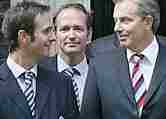
There was an awe-inspiring inevitability about Tiger Woods’s recent victory in the PGA, as there had been at his similar triumph in the previous Major at Royal Hoylake. In both wins we saw a “new, improved Tiger” – one who has now added the component of exceptional course management to his already peerless game. It seems that Tiger, working so effectively with his caddy Steve Williams, has worked out that if he plays to his strengths and manages his weaknesses then he will be almost unbeatable. Weaknesses? Well to start with Woods is one of the least accurate drivers on the PGA tour. His current record of hitting fairways with just under 60% of his drives puts him a lowly 152nd on the tour. Then there is his putting. The conventional wisdom is that to win golf tournaments you have to be a master on the greens. Well this year Tiger’s putting record is pretty average – his number of putts per hole record places him only 61st in the rankings. What about bunker play then, surely Woods is a master at getting down from the sand? No again, Tiger is only 44th in the list when it comes to “sand saves” – getting down in two or less from a trap.
So how can this inaccurate driver, who is only an average putter and struggles in the bunkers be having such a successful season? Well the sand play record gives us a clue. True, Woods is a long way from being the best bunker player – but he doesn’t get into them that often! His record this year is that he has only been in a bunker 54 times – slightly over once per round, a record that is close to being the best on the tour. The traps are placed to penalise wayward iron shots – on approach on a Par four or five and from the tee on the Par 3 holes. And it is with the approach irons that Tiger is unrivalled – the statistics indicate that Tiger is the most accurate player around on approaches to the green. And this is where his new found confident course management comes into play. At Hoylake Tiger rarely took a driver off the tee because he didn’t need to. He knew that to be well-positioned for the crucial shot to the green was all-important so he concentrated on position rather than length - and he did the same in the PGA. It is this astute and focused tactical play that has given Woods the best birdie record of all – he has more birdies on Par 4 and Par 5 holes this year than any other player.
Whilst the statistics of Tiger Woods 47 rounds of golf this year give some clear pointers as to the reasons for his success (six wins out of 13 events played) they only tell half the story. The real key to Tiger’s success comes from the fact that he is very hard to beat when he has victory in his sights – especially during the final round. His final round partners Sergio Garcia (at The Open Championship) and Luke Donald (at the PGA) found that their games wilted in the face of Tiger’s will to win. Garcia had a final round 73 to Woods’s 67 at Hoylake and Donald a 74 to Woods’s 68 at Medinah – they were both blown away!
The combination of technical excellence, unrivalled iron play, shrewd course management and still hungry ambition makes Tiger Woods the complete golfer and the consummate professional – especially in the tournaments that really matter. So what can we expect in the Ryder Cup next month – the only form of golf where Tiger has under-performed (he has won just 7 of his 20 Ryder Cup matches)? How can a man who destroys his rivals so completely in final day head to heads have such a modest record in Ryder Cup match play? My guess is that Tiger’s Ryder Cup record (whatever the reasons for it) is something that he will want to put right this year. Tiger, like all the greatest sportsman, hates to lose and he has been on a losing Ryder Cup team three times out of four. Whilst nothing in golf is certain I have a feeling that US Ryder Cup Captain Tom Lehman can bank on the maximum points from his leading player this year!





